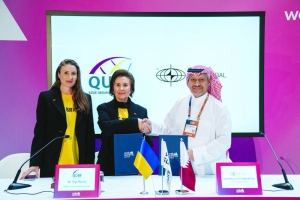Digital transformation helps Qatar in building robust governance

Doha, Qatar: Prioritising digital transformation solidifies Qatar’s governance and sets a benchmark for global nations in building transparent, inclusive, and technologically advanced societies, an official said.
Mobile platforms and online portals ensure services are available to all segments of society, fostering inclusivity. However, AI-powered tools can identify gaps in service delivery, enabling targeted interventions. Moreover, e-governance tools empower citizens to participate in decision-making processes, building trust and collaboration between governments and their people.
In an interview with The Peninsula, the Business Development Director at Mozn, Hanan Alqahtani said “Digital transformation has the power to revolutionise governance by making public services more accessible, efficient, and transparent. By digitising processes, Qatar can enhance accountability and reduce the risk of corruption.”
As digital financial services expand, institutions face heightened risks from cyber threats, including phishing, ransomware, and data breaches. Alqahtani stressed that establishing robust cybersecurity frameworks and integrating them with financial crime prevention measures ensures a cohesive response to these interconnected threats.
Regular penetration testing, advanced encryption, and secure data storage are critical components of a solid defense. Market leaders therefore note that a partnership between financial institutions, regulators, and law enforcement agencies is pivotal.
She said “Sharing information on emerging crime tactics and training employees on the latest anti-money laundering (AML) and counter-terrorism financing (CTF) regulations builds a skilled workforce capable of swiftly addressing risks. Complementing these efforts, customer education and awareness campaigns reduce vulnerabilities to phishing and social engineering attacks, strengthening the overall resilience of the financial ecosystem.”
On the other hand, the shortage of skilled professionals capable of operating and optimising these technologies is one of the common challenges.
“As advancements accelerate, organisations need staff proficient in both compliance and emerging technologies. Yet, a regional talent gap limits institutions’ ability to fully harness these technologies’ potential. To tackle this, financial institutions can invest in continuous training programs for existing employees, partner with academic institutions for talent development, and collaborate with technology providers for specialized training,” Alqahtani said.
The official also emphasised that the entities must continue investing in AI-driven technology and partner with tech companies to facilitate the adoption of tools and systems that allow them to scale and combat the ever-growing sophisticated criminal tactics and methods to take over customers’ and citizen’s data and information.
However, reinforcing international cooperation is a significant step toward addressing cross-border financial crimes. She accentuated that “Qatar can deepen ties with global regulatory bodies, actively participating in joint task forces and information-sharing initiatives. Establishing bilateral agreements with other nations to streamline data exchange and collaborate on investigations will also enhance its effectiveness.”
Additionally, Qatar’s hosting of regional forums and training programs to boost collective knowledge and innovation in combating financial crimes enables Qatar to position itself as a hub for collaboration and expertise by playing a pivotal role in shaping the global fight against financial crime.
Related
QUBF launches ‘Qatar-Ukraine Tech and Innovation Committee’
Dr Olga Revina, chairperson of QUBF, and Sheikh Mansoor bin Khalifa al-Thani, fou
Initiative to support digital innovation in Qatar launched
Assistant Undersecretary for Digital Industry Affairs at MCIT Reem Al Mansoori, and General Manager of Microsoft Qatar Lana Khalaf exchanging documents after s
MCIT, Microsoft Sign Partnership Initiative to Support Digital Innovation and…
As part of its efforts to enhance digital innovation and support the growth of startups in the country, the Ministry of Communications and Information Technolog
IIA Qatar hosts session on tech-driven transformation in internal audit
Officials pose during the seminar hosted by Institute of Internal Auditor Qatar Chapter. Doha, Qatar: The Institute of Internal Auditor Qatar Chapter r












